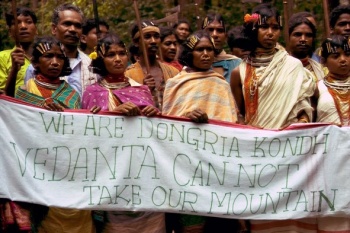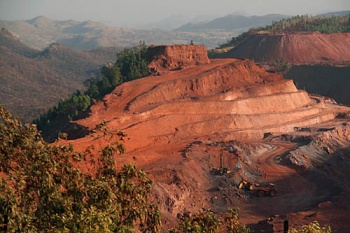Difference between revisions of "Mining and Metals"
Dan Nemenyi (talk | contribs) |
Dan Nemenyi (talk | contribs) |
||
| Line 13: | Line 13: | ||
We also document the effects of mining activities on communities around the world, and expose attempts to generate 'greenwashing' PR and CSR initiatives.<br><br> | We also document the effects of mining activities on communities around the world, and expose attempts to generate 'greenwashing' PR and CSR initiatives.<br><br> | ||
| − | + | This portal is part of [[Powerbase:About|Powerbase]]—your guide to networks of power, lobbying and deceptive PR. Powerbase has a policy of [[Powerbase:A Guide to Referencing|strict referencing]] and is overseen by a [[User:Melissa Jones|Managing editor]], a [[User:David|Sysop]] and several associate Portal editors.<br><br> | |
<td width="50%">[[Image:Bauxite red earth mining.jpg|thumb|right|350px||'''Bauxite mining in India''': aluminium ore is shallow strip mined from semi-tropical forests, often displacing indigenous peoples and creating large scale soil erosion and water pollution.]] | <td width="50%">[[Image:Bauxite red earth mining.jpg|thumb|right|350px||'''Bauxite mining in India''': aluminium ore is shallow strip mined from semi-tropical forests, often displacing indigenous peoples and creating large scale soil erosion and water pollution.]] | ||
Revision as of 10:14, 22 August 2011
Welcome to the Mining and Metals portal on Powerbase | ||
|---|---|---|
Why mining and metals? British-registered Indian aluminium company Vedanta has been exposed for human rights and environmental violations in its quest for 73 million tonnes of bauxite from the tribal mountain homeland of the Dongria Kondh Metals are all around us – from your can of lemonade, to your bike, car or plane, to your laptop, buildings and pots and pans. But we rarely think about where these materials come from and what impact they have on the planet and people. Mining and metals companies, with the support of their trade associations, think tanks, corporate social responsibility programmes and PR agencies, try to paint their products as clean and green. Yet these are among the most polluting and energy intensive industrial processes in the world, often linked to the displacement of indigenous peoples, poor working conditions, conflict, human rights abuses, pollution, climate change and militarisation. Around 30 per cent of aluminium, for example, is used by the arms or 'defence' industry, making it an important 'strategic metal' for governments. [1] |
|
|
| ||||||||
References
|

